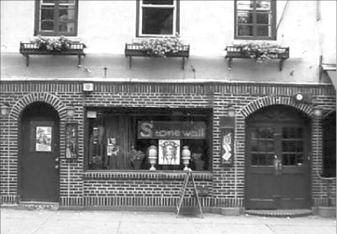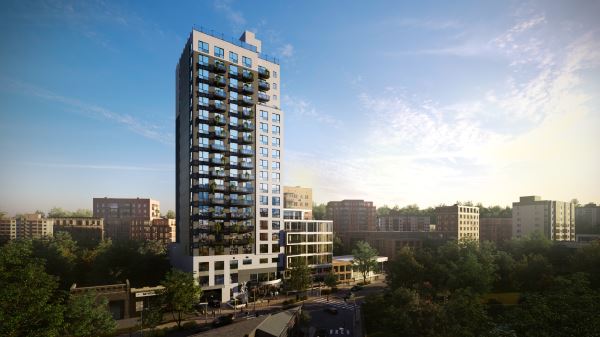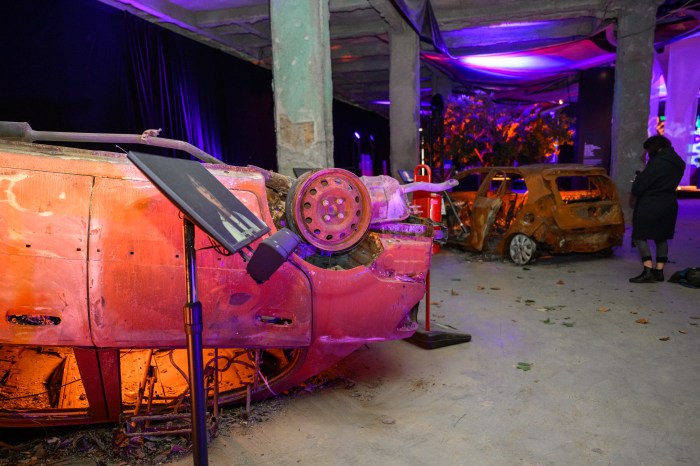Neighbors unhappy about bar’s patrons, but others charge racism
Despite recent reports in the New York Observer and elsewhere, the historic Stonewall Tavern on Christopher Street appears likely to remain open, even if under new owners. According to the owner of the building that houses the bar, Duell Management, a new tenant has just signed a lease on the premises and plans to keep operating under the same name as a gay establishment.
The news, however, is not making everyone happy.
The outgoing lessee, Dominick Desimone, reopened the bar at 53 Christopher Street in 1989, after a long hiatus and promised to restore it to its traditional glory as the birthplace of the June 1969 riots popularly viewed as the spark for the modern gay liberation movement. In recent years, however, complaints against the establishment have mounted from both its West Village neighbors, who objected to the clientele—increasingly young black men—and from Stonewall’s own bartenders, who faulted Desminone’s management style.
The dissatisfaction with the most teeth, however, came from the property owners at Duell Management since Desimone fell behind in rent to the tune, they say, of $150,000 on the $20,000-a-month lease.
But, according to Greg Kennelly, business management director at Duell Management, “The bar name is staying, with a different lessee.”
“It’s a turnkey business,” he explained. “In my opinion, if I bought a place that operates and has clientele, I would keep it. It’s just corporate turnaround; that’s what people do. [The new lessees] have a lot of pride in that neighborhood… I know they will do everything to impress the neighbors.”
As far as neighbors are concerned, that may take some work. In an August 28 story in the Observer, members of Community Board 2 as well as another nightlife establishment down the street, the Duplex, voiced their complaints about what Duplex owner Bill Morgan described as “this new, urban, hip-hop, gangster clientele.”
“Stonewall over the last few years has been a blight on the community and an embarrassment to the gay community,” Rick Panson, a member of Community Board 2, was quoted saying in the Observer. “The gay community is not looking for a strip-club-mentality lifestyle.”
But complaints have not been limited to outsiders. Tree, a longtime Stonewall bartender, was among those who faulted the climate at the bar, saying, “The clientele has changed, and the neighborhood is not happy. I go home at 10 p.m., and while I’m working I don’t tolerate people hanging around, but at night it’s a different clientele.”
“People are complaining that there are fights on streets,” he continued. “I’ve even seen young African-American people pushing old people. They don’t have enough money to go into the bar, so they are on the streets hanging out. If they were nice people, I wouldn’t mind. I don’t like the changing clientele, and I don’t think anyone does. Not even bartenders, because they either don’t drink or don’t tip, and we find mini bottles of booze in corners at the end of the night.”
But leaders in the African-American LGBT community argue that the problem is not the behavior of the club’s customers, but rather the reaction of its West Village neighbors.
“The bar built these nights specifically for the clientele,” said Michael Roberson, director of services for the Brooklyn-based HIV prevention group People of Color in Crisis. “They got black promoters for [Monday and Saturday] nights, black DJs—they built those nights. I won’t deny that younger urban clientele have less money to spend at bars, tip less, and all that other stuff… but the flip side is what’s wrong with Tuesday, Thursday, Sunday? You didn’t do enough to keep your clientele. Maybe because of this racism that clientele didn’t want to come in that bar.”
According to Roberson, who said his group’s clients are frequent patrons of Stonewall, the club’s “Touch” Monday night party has packed the house for nearly four years, cultivated by “legendary black party promoter” Charles Jackson and transgendered host Tyra Allure. He said that young black and Latino clients also started attending the club on Saturdays, frustrated by the limited number of venues catering to the black gay community––Bonified in Manhattan, and Langston’s, Rockwell’s, and the Chocolate Bar in Brooklyn.
“Because of that, some of the black gay parties are in white-owned spaces, and sometimes the security and kind of treatment you get is not as welcoming,” Roberson said. “They are asking for several forms of identification of black and Latin clientele.”
“The fact that these young people often have limited entertainment options and so tend to hang out in the Village is a community issue,” said Mark Jason McLaurin, executive director of the New York State Black Gay Network. “I’ve spent many nights partying in the Village and I am here to report that these young people don’t have anything close to a monopoly on being loud or goofing off. The fact that there seems to be an exclusive focus on these young people of color as opposed to, say, the typical patron of Duplex, leads me to believe there is much more going on here than meets the eye.”
McLaurin said that if neighbors were concerned about the disruptive youth element, they were doing nothing to find alternatives for these kids, asking, “How many $25-a-head fundraisers have you had for the Ali Forney Center or FIERCE? What’s your responsibility in this?”
The Ali Forney Center provides safe housing services for homeless LGBT youth and FIERCE is a social service and advocacy group that works to protect the interests of queer youth who socialize in the West Village.
“The more things change, the more they stay the same,” McLaurin argued. “For a gay bar owner to juxtapose regular gays with urban, hip-hop gangsters is ridiculously absurd and patently racist. Here’s a news flash––those kids are, by and large, gay too! It was their forebears who stood in the street nearly 40 years ago and made it possible for there to be a Duplex Club, and [Bill Morgan] would do well to remember that. It was black and Latin drag queens who started the Stonewall Riots. If anyone deserves to be here it’s them instead of these gentrified gays.”
A leading historian of the Stonewall Riots, however, offers a less clear cut description of the crowd that fought police over several evenings in late June 1969. According to David Carter, author of “Stonewall: The Riots that Sparked the Gay Revolution,” his research showed that transvestites were the first to resist inside the club when police began one of their frequent raids, but that street youth and gay radicals picked up the fight outside.
“And as for the street youth, the best I can reconstruct, it was mostly gay men who were more effeminate than your average gay man, who could not hide the fact that they were gay,” Carter said. “They were mostly white, only a few did drag… they were from different classes and only a handful—10 percent—were transgendered… There were black and Latino queens, but not any more than in the greater New York population.”
Carter has been an opponent of the club since Desimone first took over in 1989, telling Observer reporter John Koblin, “They were interested in exploiting the Stonewall name to make money. They had no appreciation for the site itself. I think it was a purely moneymaking venture done under the guise of preserving and honoring history. This was a total fraud from the beginning.”
Carter has a very different vision for the site––“to buy both 51 and 53 Christopher Street, put them up for sale to various wealthy members of the community, and donate it to the community.”
He said he would like to restore the bar’s interior to what it was in the period from 1967 through 1969, “with the old jukebox and everything.”
Carter said he hopes the premises can “serve both as an archive museum and a teaching place, to teach young people about gay history. At nighttime it could still function as a bar, run somewhat like it was in the ‘60s. They could have mock police raids, to get a feel for how it would be.”
“The reason I think it is so important is that when it comes to gay history, there are not many places that are significant,” said Carter. “Where’s our Gettysburg Battlefield? Where’s our Mount Vernon? The Stonewall Riots are what most people know in terms of gay history. It is very important for people to have a tangible connection to history.”
Tree, the Stonewall bartender, for one agreed.
“Stonewall is our history; this bar should be here forever,” he said.
For the time being, however, it appears that Stonewall will remain open—as a for-profit gay bar rather than a historical museum.
gaycitynews.com


































